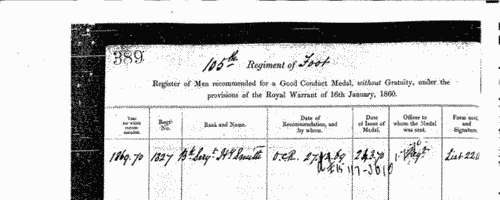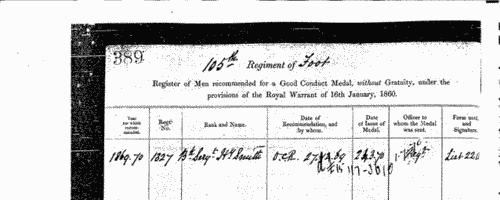Mcgennis Surname Ancestry ResultsOur indexes 1845-1865 include entries for the spelling 'mcgennis'. In the period you have requested, we have the following 4 records (displaying 1 to 4): Buy all | | | Get all 4 records to view, to save and print for £32.00 |
These sample scans are from the original record. You will get scans of the full pages or articles where the surname you searched for has been found. Your web browser may prevent the sample windows from opening; in this case please change your browser settings to allow pop-up windows from this site.  Sailors of H. M. S. London who fought at Inkerman
(1854) Sailors of H. M. S. London who fought at Inkerman
(1854)
Sebastopol in the Crimea was the great Russian naval arsenal on the Black Sea. A combined assault by British, French and Turkish troops resulted in the reduction of Sebastopol and led to the Treaty of Paris of 27 April 1856, guaranteeing the independence of the Ottoman Empire. By Admiralty Order the Crimea Medal was awarded to sailors and marines present during the campaign, between 17 September 1854 (the first landing at Eupatoria) and 9 September 1855 (when the allies secured Sebastopol). Her Majesty's Ship London, a 90-gun sailing ship, took part in the assault. Four clasps to this medal were awarded to the men present in the actions at Sebastopol itself, Inkerman, Balaklave (Balaclava) and (the sea of) Azoff. This is the roll for the sailors of the ship actually present at the battle of Inkerman, on 5 November 1854, where the Russian troops made an ultimately unsuccessful attack on the allied army.MCGENNIS. Cost: £8.00.  | Sample scan, click to enlarge

|  London Policemen
(1843-1857) London Policemen
(1843-1857)
The Metropolitan Police Register of Joiners (MEPO 4/334) lists policemen joining the force 1 January 1843 to 1 April 1857 (warrant numbers 19893 to 35804). The register is alphabetical, in so far as the recruits are listed chronologically grouped under first letter of surname. It gives Date of Appointment, Name, Number of Warrant, Cause of Removal from Force (resigned, dismissed, promoted or died), and Date of Removal. Although the register was closed for new entrants at the end of 1842, the details of removals were always recorded, some being twenty or more years later. Those recruits not formerly in the police, the army, or some government department, were required to provide (normally) at least two letters of recommendation from persons of standing, and details of these are entered on the facing pages: the names in these are indexed separately - this index refers only to the police constables. Where a recruit was only recently arrived in the metropolis, the names and addresses of the recommenders can be invaluable for tracing where he came from.MCGENNIS. Cost: £8.00.  | Sample scan, click to enlarge

|  Outstanding soldiers of the 52nd regiment of Foot
(1860-1870) Outstanding soldiers of the 52nd regiment of Foot
(1860-1870)
The 52nd (Oxfordshire) Regiment of Foot (Light Infantry) embarked for India in 1853. It helped suppress the Indian Mutiny, taking part in the capture of Delhi, and returned to England in 1864: the regimental depot was at Chatham. In 1868 the regiment was sent to Malta. Each year just a handful of outstanding soldiers of the regiment were chosen for good conduct medals and gratuities: these are listed here. There were two lists, one for men recommended for the Good Conduct Medal without a gratuity, and one for gratuities - £5 to a private, £10 to a corporal, and £15 to a serjeant. Both lists are indexed here, and each gives rank, name, regimental number, date of recommendation and date of issue. (The sample scan is from the 105th foot)MCGENNIS. Cost: £8.00.  | Sample scan, click to enlarge

|  Outstanding soldiers of the 8th regiment of Foot
(1860-1870) Outstanding soldiers of the 8th regiment of Foot
(1860-1870)
The 8th (The King's) Regiment of Foot was in two battalions. The 1st battalion embarked for Bombay in 1846, took part in the capture of Delhi and the relief of Lucknow, and returned to England in 1860. The home depot was at Chatham. The battalion moved to Ireland for 1865-1866, and then embarked from England to Malta in 1868. The second battalion was based at Templemore in Ireland, but was sent abroad in 1858, and served on Gibraltar to 1863, on Malta to 1868, then returning to England. Each year just a handful of outstanding soldiers of the regiment were chosen for good conduct medals and gratuities: these are listed here. There were two lists, one for men recommended for the Good Conduct Medal without a gratuity, and one for gratuities - £5 to a private, £10 to a corporal, and £15 to a serjeant. Both lists are indexed here, and each gives rank, name, regimental number, date of recommendation and date of issue. (The sample scan is from the 105th foot)MCGENNIS. Cost: £8.00.  | Sample scan, click to enlarge

|
Research your ancestry, family history, genealogy and one-name study by direct access to original records and archives indexed by surname.
|







